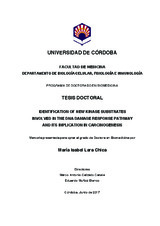Identification of new kinase substrates involved in the DNA Damage Response pathway and its implication in carcinogenesis
Autor
Lara Chica, M. Isabel
Director/es
Calzado Canale, Marco AntonioMuñoz Blanco, Eduardo
Editor
Universidad de Córdoba, UCOPressFecha
2017Materia
Cancer cellsCarcinogenesis
Kinases
DNA Damage Response
CHK2
DYRK2
Substrates
SIAH2
CDC25A
Molecular biology
METS:
Mostrar el registro METSPREMIS:
Mostrar el registro PREMISMetadatos
Mostrar el registro completo del ítemResumen
One of the most relevant altered pathways in cancer is the DNA Damage
Response (DDR), a well-coordinated network of signalling cascades that cells have
developed during evolution in order to maintain genomic integrity. These pathways are
activated when genomic material is damaged with the aim of transmit the damage
signals to effector proteins, and induce cellular responses including cell cycle arrest,
activation of DNA repair pathways, and cell death; thus preventing tumorigenesis.
CHK2 and DYRK2 are key downstream kinases of the DDR, involved mainly in the
regulation of cell cycle and DNA repair. The identification of new substrates for these
kinases will delve into knowledge of their functions within the DDR, which leads to
tumor development and progression when deregulated.
In the present work we demonstrate how CHK2 presents the ability to
phosphorylate the E3 Ubiquitin ligase SIAH2, affecting its activity on certain substrates.
Additionally, SIAH2 regulates CHK2 basal turnover through ubiquitination and
proteasomal degradation. In response to DNA damage, the interaction between both
proteins is disrupted, which favors CHK2 stabilization. This new CHK2 regulation
mechanism has an influence on cell cycle progression and on the ability of hypoxia to
alter DDR pathway in cancer cells, since resistance to apoptosis induced by genotoxic
agents in cells subjected to hypoxia could be partly explained by the mutual regulation
between CHK2 and SIAH2. We also describe the capacity of DYRK2 to modulate the
turnover of the checkpoint phosphatase CDC25A through an ubiquitin/proteasome and
DYRK2 kinase activity dependent process. DYRK2 directly phosphorylates CDC25A in
vitro, although DSG or KEN motifs are not involved in the CDC25A degradation by the
proteasome mediated by DYRK2. Different stimuli, such as DNA damage or serum
starvation, result in an inverse correlation of DYRK2 and CDC25A expression, which is
also observed at endogenous levels in human lung cancer cell lines and human lung
cancer tissues.
Taken together, our findings report new substrates (SIAH2 and CDC25A) for
two relevant kinases involved in the DDR pathway (CHK2 and DYRK2), helping to
elucidate the molecular mechanisms through which this pathway operates. These data
certainly help to improve the understanding of the regulation processes of these
relevant kinases and will extend the knowledge about the molecular biology of cancer
as well as provide new therapeutic opportunities for cancer treatment.

